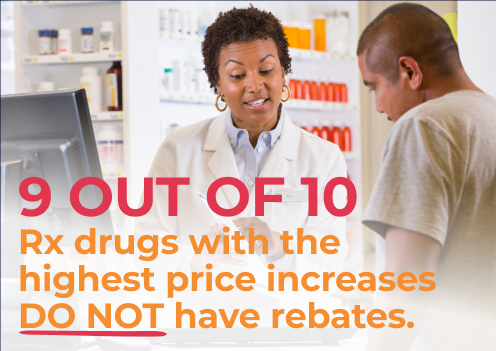Q&A: Rx Rebates are Unrelated to Drug Prices

As a new year begins, many Americans – including Members of Congress – are rightly asking why drug manufacturers are once again raising their prices. While Big Pharma continues to distract from this reality, a new study from Matrix Global Advisors (MGA) CEO Alex Brill sheds new light on some of the drug companies’ tall tales about rebates. In the study, Brill found that most prescription drugs with the largest list price increases do not have rebates.
The analysis adds to a growing body of work showing that rebates are unrelated to drug prices. To learn more, CAPD Spokeswoman Maura Keefe sat down for a Q&A with MGA’s Alex Brill to discuss the study.
Maura Keefe: Alex, thanks for chatting. If you had to sum up the key finding of your new report in one sentence, what would it be?
Alex Brill: Thanks, Maura. To summarize: Drug rebates are not associated with list price increases. In fact, among the subset of drugs we studied – those with the biggest price hikes between 2018 and 2023 – nine out of ten did not have rebates.
MK: Why does it matter that these drugs don’t have rebates?
AB: Well, you hear drug manufacturers claim that rebates are the reason they raise the list prices of their drugs, but the data really poke holes in that excuse. For example, this new analysis shows that among drugs with the biggest price hikes, the vast majority don’t have rebates.
MK: So, based on your research, rebates aren’t driving these big price increases we are seeing. Let’s zoom out for a second – what are rebates?
AB: Essentially, they’re volume discounts on prescription drugs. Rebates are savings that pharmacy benefit managers (PBMs) negotiate from drug companies. PBMs use the collective bargaining power of millions of Americans to lower drug costs.
MK: Are there any other notable findings from your report that you’d like to highlight?
AB: I think it’s worth noting that price increases were much larger among the drugs without rebates than the drugs that did have rebates. Drugs with no rebates had an average price hike of 93% – that’s nearly doubling the price. In contrast, drugs with rebates had a lower average price increase of 44%.
MK: That’s really interesting. We know that Members of Congress and other state policymakers are considering bills to restrict PBM-negotiated rebates. What does this research tell them?
AB: Importantly, making changes to restrict rebates will not effectively lower drug prices for Americans. That’s what this study and other research I’ve done clearly shows.
There are many other opportunities for Congress to make a difference in lowering drug prices by bolstering competition in the market. Limiting drug companies’ ability to use patent thickets and other anticompetitive tactics would go a long way to saving billions of dollars in the healthcare system.
MK: Thanks, Alex!
To learn more, see CAPD’s press release on the research and read the full report.
